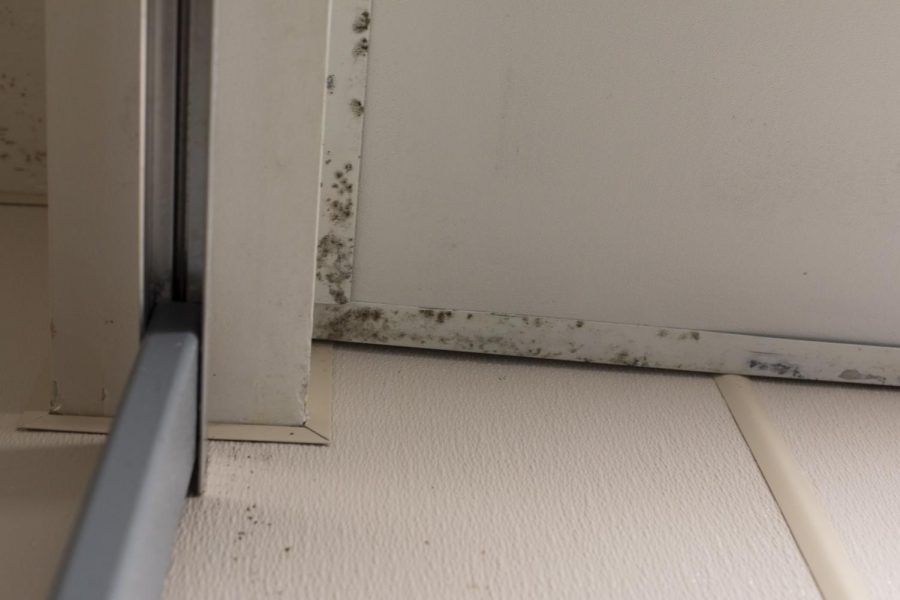‘Never going away’: Reports of mold resurface at WKU
September 24, 2019
Editor’s note: This story previously had a photo with a caption that said there was asbestos in Rodes-Harlin Hall. WKU has clarified there is no asbestos in the building, according to the university’s Environmental Health and Safety Office. The caption has been corrected. The Herald regrets the error.
Despite thorough cleaning, as well as proactive and reactive measures from WKU, mold is still proving to be an issue for students living in residence halls.
The university has seen about 10 maintenance requests related to mold placed on a daily basis, said Mike Reagle, assistant vice president for student engagement and executive director for housing and dining for WKU.
Reagle said part of the cause of mold outbreaks can be traced to room temperature, since students often lower their thermostats to the lowest setting.
“When you do that, you’re inviting problems into that, because you’re trying to throw too much cold air into a system,” Reagle said.
Mold buildup can also be traced to excessive heat, aging systems in buildings and the ways in which dorm rooms are constructed with the air conditioner directly underneath the window, Reagle said. This combination is to blame for mold buildup, he said.
“What you’re doing is you’re running all of this cold air through this metal box right next to where all the heat and humidity come in,” Reagle said. “What you’re doing is introducing this hot, humid air right on top of cold air. It will cause mold every single time.”
Reagle said maintenance crews are dispatched to clean up mold often within the day the complaint was made or the day after.
“If we get a call in at four o’clock in the afternoon, we’re gonna send our night crew in to at least look at it and see what’s going on,” Reagle said. “[Ten] may sound like a lot, but you figure we have 15 buildings and 2,500 rooms — that’s less than one per building.”
Even with this, Reagle said the issue of mold is never going to be fully resolved.
“Mold is never going away,” Reagle said. “Mold has been around for millions of years and is not going away.”
Bobby Burt, a writer for the WKU Talisman, is currently seeking medical assistance in his hometown of Louisville after experiencing strep throat, a fever and chills, among other concerns.
Burt, a Northeast Hall resident, said he’s only felt sick while in his dorm.
“I stayed the night at Hilltopper [Hall] and after that I didn’t wake up feeling like complete garbage,” he said. “So it’s literally when I wake up in my own dorm when I feel the most sick.”
Burt’s sickness has reached a point where he will likely need to have his tonsils removed, he said.
This isn’t the first time Burt has experienced symptoms while living in a dorm, he said.
“I started [noticing symptoms] this last Monday,” Burt said. “This is the second straight year this has happened to me.”
Burt lived in Barnes-Campbell Hall last year, where he began feeling sick with a fever, chills and a sore throat.
Burt said he asked a hall director if he could move to Zacharias Hall. Housing and Residence Life charged him over $150 for the move, he said.
“They didn’t even help me move my stuff,” Burt said. “I had to move it by myself with a dolley.”
Once he moved into Zacharias, Burt said his symptoms stopped, but returned when he moved into Northeast this year.
This incident comes after Minton Hall was closed down last fall after almost 70 complaints of mold were filed. Minton was evacuated, a deep cleaning took place in the building and it reopened for the all 2019 semester.
According to an email from WKU Media Relations Director Bob Skipper, bathrooms in WKU’s dorms are cleaned daily throughout the week and students can work with maintenance in order to get their mold issues resolved.
Reporter Jack Dobbs can be reached at 270-745-0655 and [email protected]. Follow him on Twitter @jackrdobbs.















